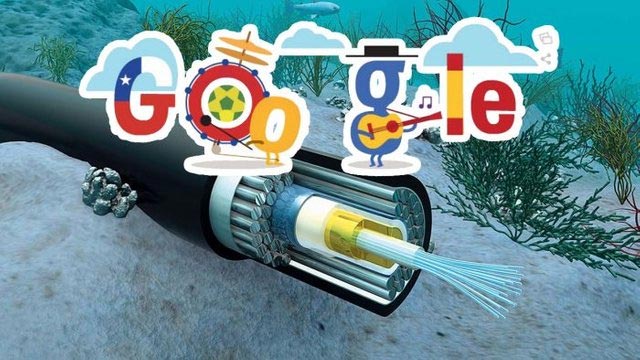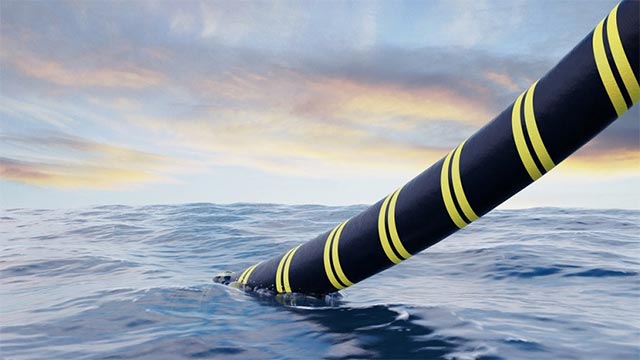Google and many other large technology companies are quietly deploying projects that can change the internet world
Google has pocketed billions of dollars in revenue from cloud-based services, and now, they are using this money to invest in a great building that can deeply affect wide for the entire internet world - that is the underground cable 'backbone', connecting the two continents of the American continent.
Last February, Mountain View giant officially announced the start of the investment and construction of the Curie cable line - a new submarine fiber optic cable, stretching from California, the United States to the South American country. Chile. If successful, this will be the first intercontinental internet cable in the world designed, built and managed by a private company not operating in the telecommunications sector. It is known that Google has also been one of the first private companies to successfully build an underground cable line (on a small scale).

- [Infographic] Countries with the fastest Internet speed in the world
In fact, most of the world's underground cable lines are owned by large private groups of companies - mainly corporations operating in the field of telecommunications services. However, by 2016, this field had significant changes with the participation of many giant content providers. Corporations such as Facebook, Microsoft, Google and Amazon seem to embrace the desire to dominate the undersea cable world in the context of the need to install new sea cable lines that are becoming increasingly urgent before the booming development of internet globalization.
It can be said that humanity is gradually entering the next era in the general development of the internet world, and the most obvious innovation is likely to appear in the field of underground cable services - a place where Only 'big players', having the capacity and responsibility can really become winners.

- NASA's Internet speed rumor reaches 91 Gb / s, is it true to download movies in 1 second?
It will be quick, probably from tomorrow, consumers will need to make a decision soon about how much they really want to put in their internet service providers and take responsibility for management. the wires connecting the world are located deep under that ocean. The problem is not only to ensure a fast, stable connection, but also to entail problems of each of our private lives in the internet world.
Have you ever wondered about the scale of fiber optic lines that are located in the tens or hundreds of meters of seabed? These underground cables are scattered on the bottom of all oceans across the globe, taking the responsibility of transmitting 95 to 99% of international network data through fiber-optic bundles that are about the same diameter as a hose. water in your garden. According to statistics, there are more than 700,000 miles (about 1,126,541km) of underground cables being used today.

- Sea cable incidents APG, IA: 3G / 4G mobile Internet users feel the most influential
In addition, while in the past, telecom service providers often invested in the construction of sea cable lines to take advantage of ownership of cable lines to sell internet bandwidth, then at the present time, the houses providing content such as Facebook, Microsoft, Google . are having a completely different approach.
Google is currently the leading content provider in investing in building its own underground cable lines. If the construction of the Curie cable route is completed later this year as expected, Mountain View giant will officially hold 16,790km of international underground cable.
Combined with the number of underground cables being owned by other large companies such as Facebook, Microsoft, and Amazon, there are a total of about 102,362km underground cables owned by private businesses outside the telecommunications sector. These cables are equivalent to nearly 2.5 times the length of the equator (in which many cable lines are still not in operation).
- The 5G era is near, but are security procedures ready?
The driving force behind Google's underground cable projects
The explosion in the need to invest in underground cable projects around the world in general and Google in particular can be answered quickly when you look at the growth in global internet traffic. took place over the past decade.
For example, in the Atlantic and Pacific regions, content providers account for more than half of the total demand for underground cable bandwidth in 2017. In fact, the need for internal data providers is content has skyrocketed from less than 8% to nearly 40% in the last 10 years.

- The Internet is experiencing a huge problem with C / C ++, causing developers to "sweat"
However, it should be noted here that similar statistics will be significantly lower when it comes to Africa and the Middle East. This shows that developed countries have a markedly higher demand, and cloud applications are the driving force behind this trend. In addition, it is necessary to mention the overall situation of the use of international bandwidth among countries, which is not small by region as well as the internet usage habits of people in each country. For a simple example, in all of 2017, India used only 4,977Mbps of international bandwidth, while the United States used 4,960,388Mbps - an amazing difference.
In fact, promoting the privatization of internet infrastructure will help reduce service prices in general, and the most likely beneficiaries are consumers. However, there is a big moral issue that we now face: Is it possible to have an additional private Internet? Or will we continue to maintain and 'preserve' the World Wide Web platform as it is now?
Unfortunately these are really 'tough' questions. When looking at the future of the internet world, we need to ask the question of what kind of internet really looks like when content providers attract the attention of many people now. You can also control your own internet routes, and manage yourself as you like. The privatized internet infrastructure can bring unprecedented benefits to consumers in the short term, but the long-term consequences it causes are also worth considering!
You should read it
- ★ Map of 420 Internet cables, stretching 1.1 million kilometers on the seabed around the world
- ★ The recovery of AAG cables must last until October 3
- ★ APG cable has not been repaired yet, the sea cable IA has been maintained, causing the Vietnam Internet to be affected internationally
- ★ Repairing AAG optical cable, Vietnam Internet quality is affected internationally
- ★ Breaking the fiber cable makes a country lose Internet connection for 2 days